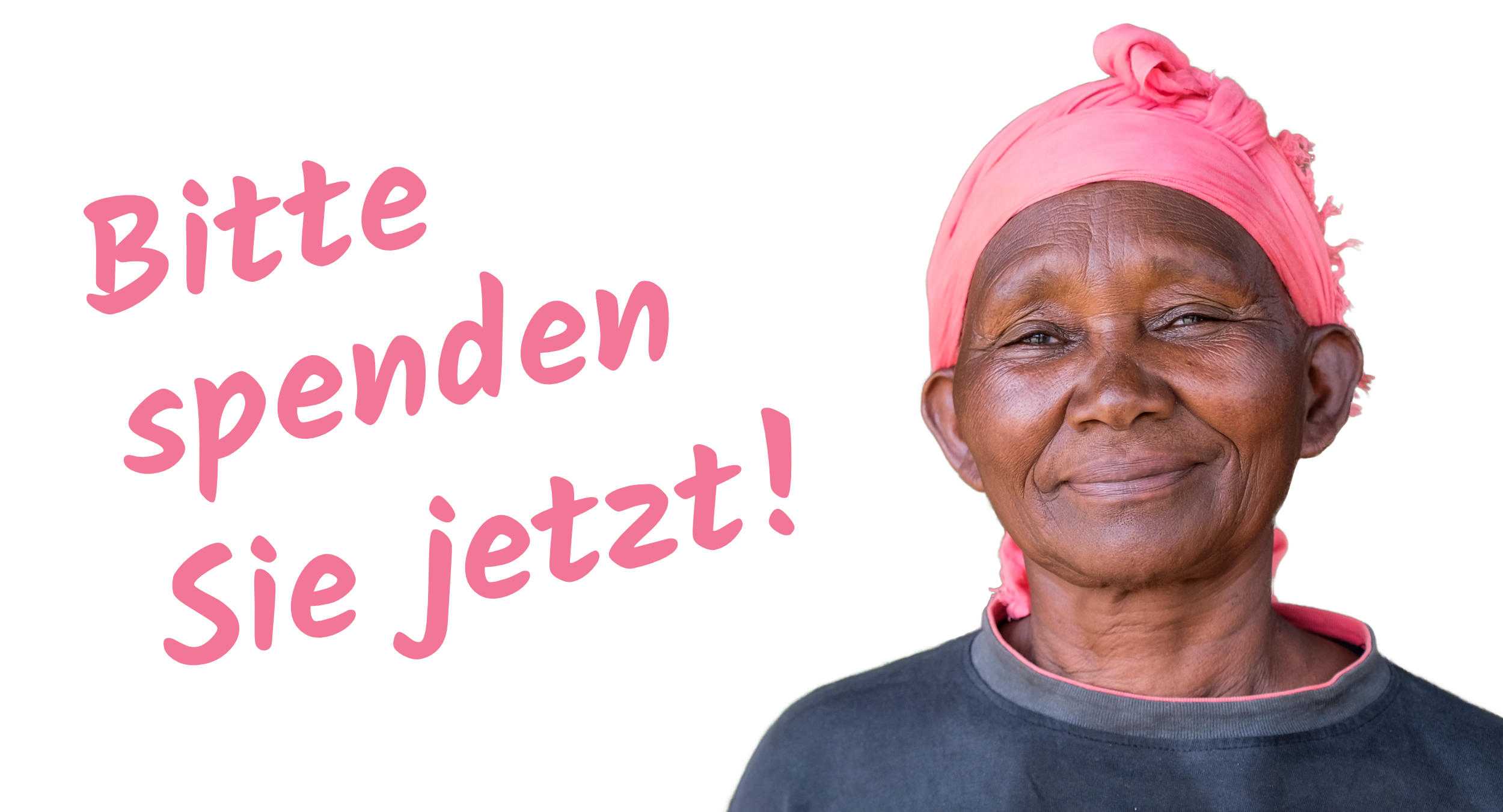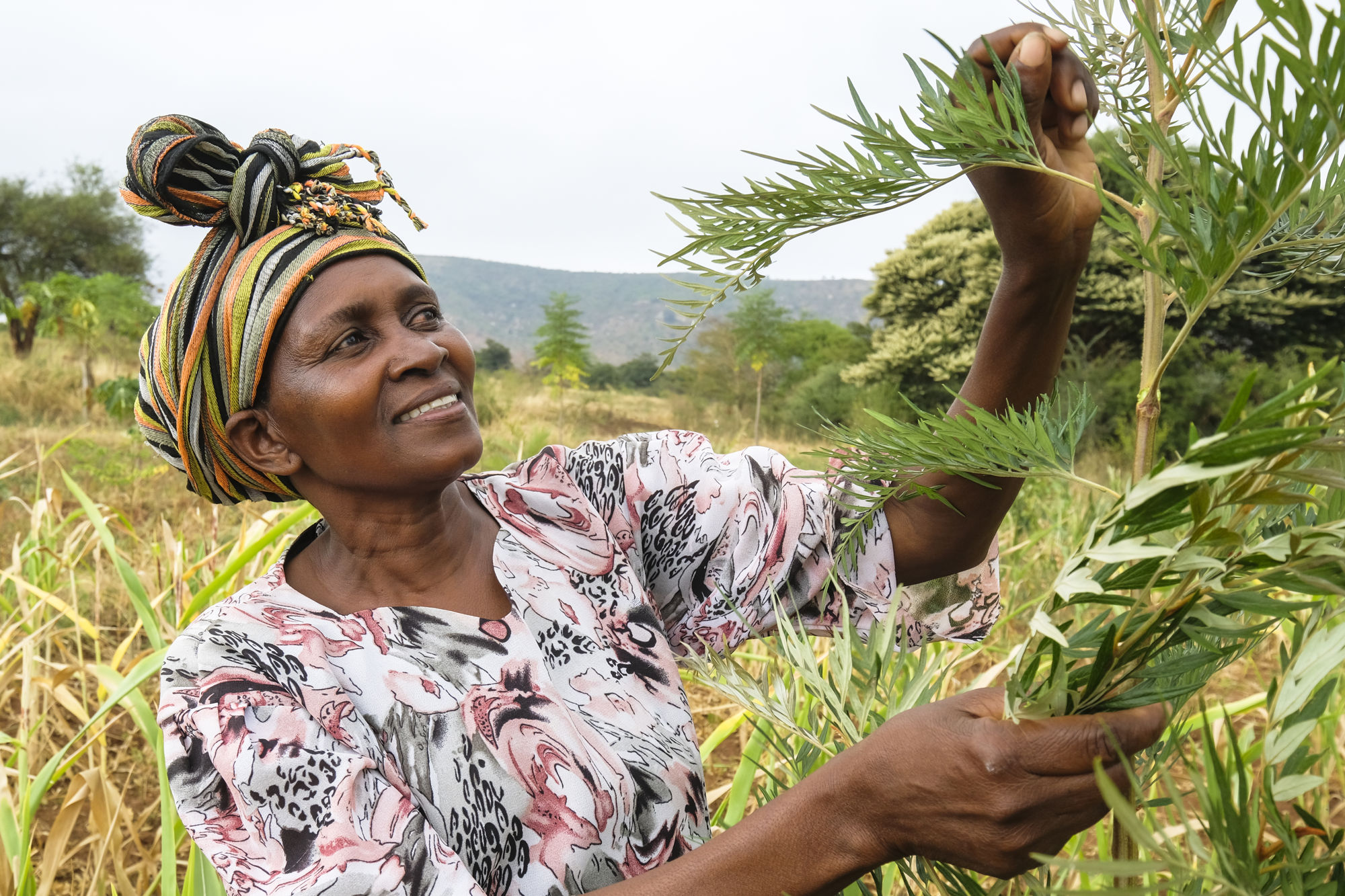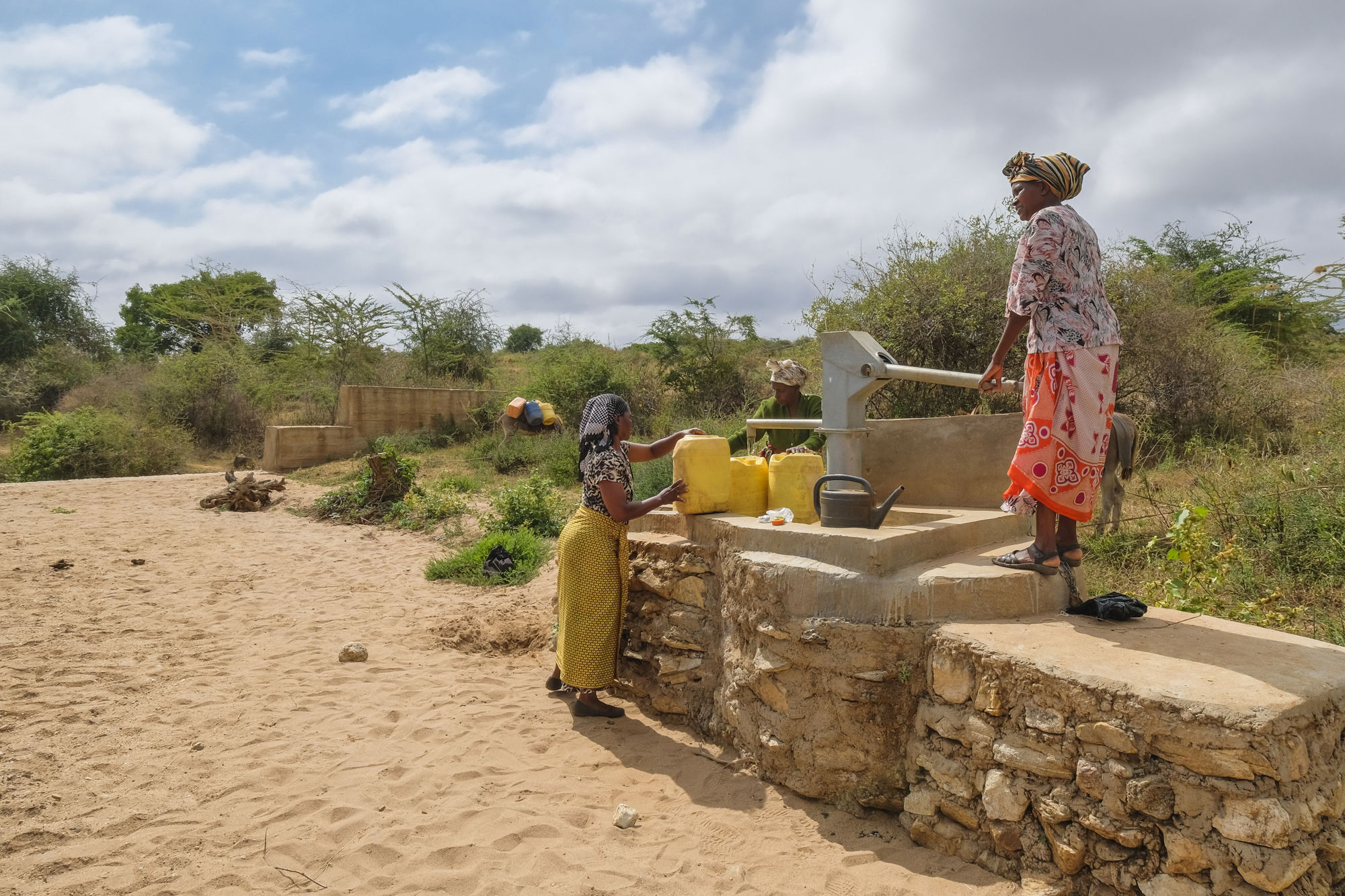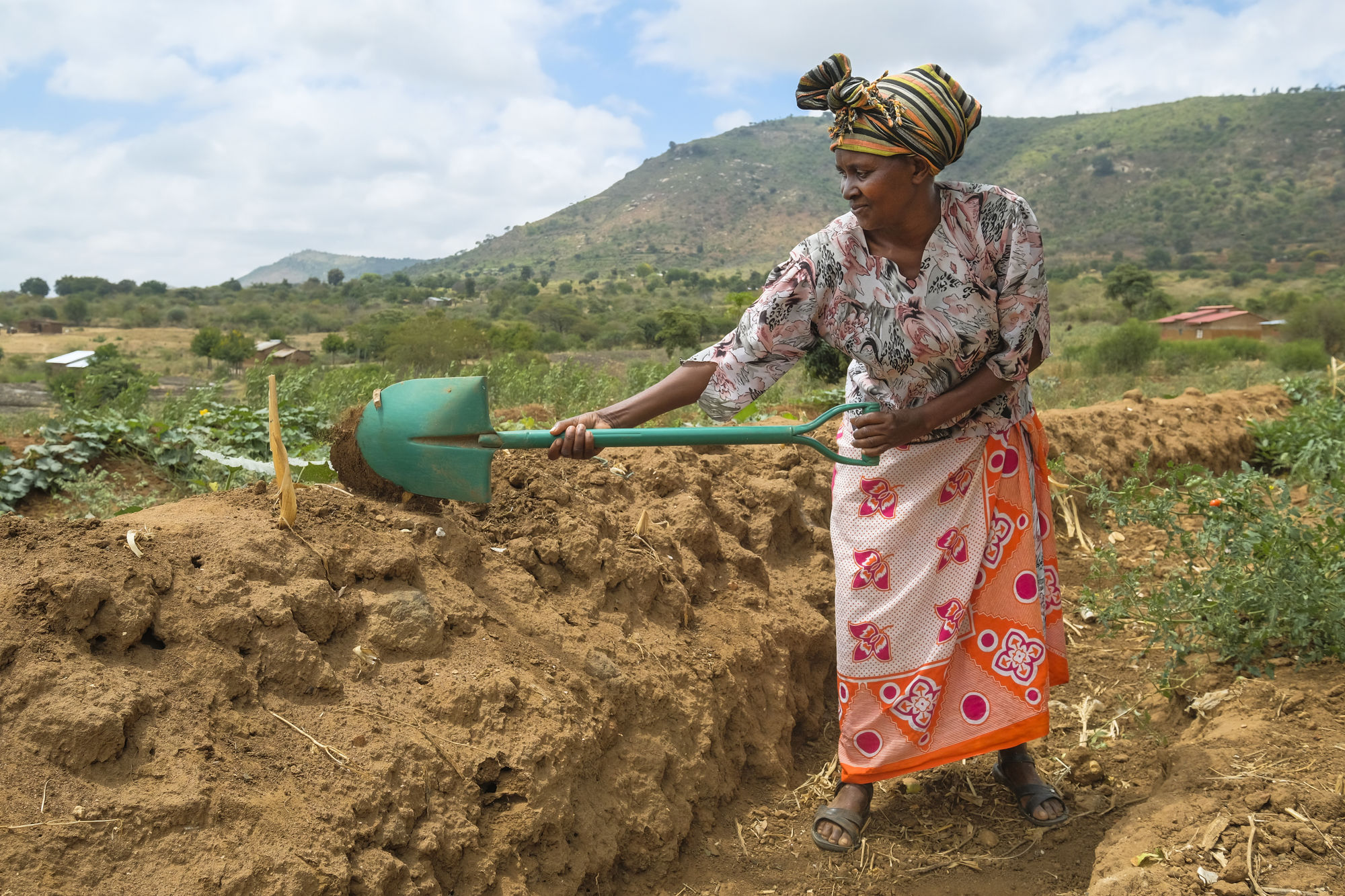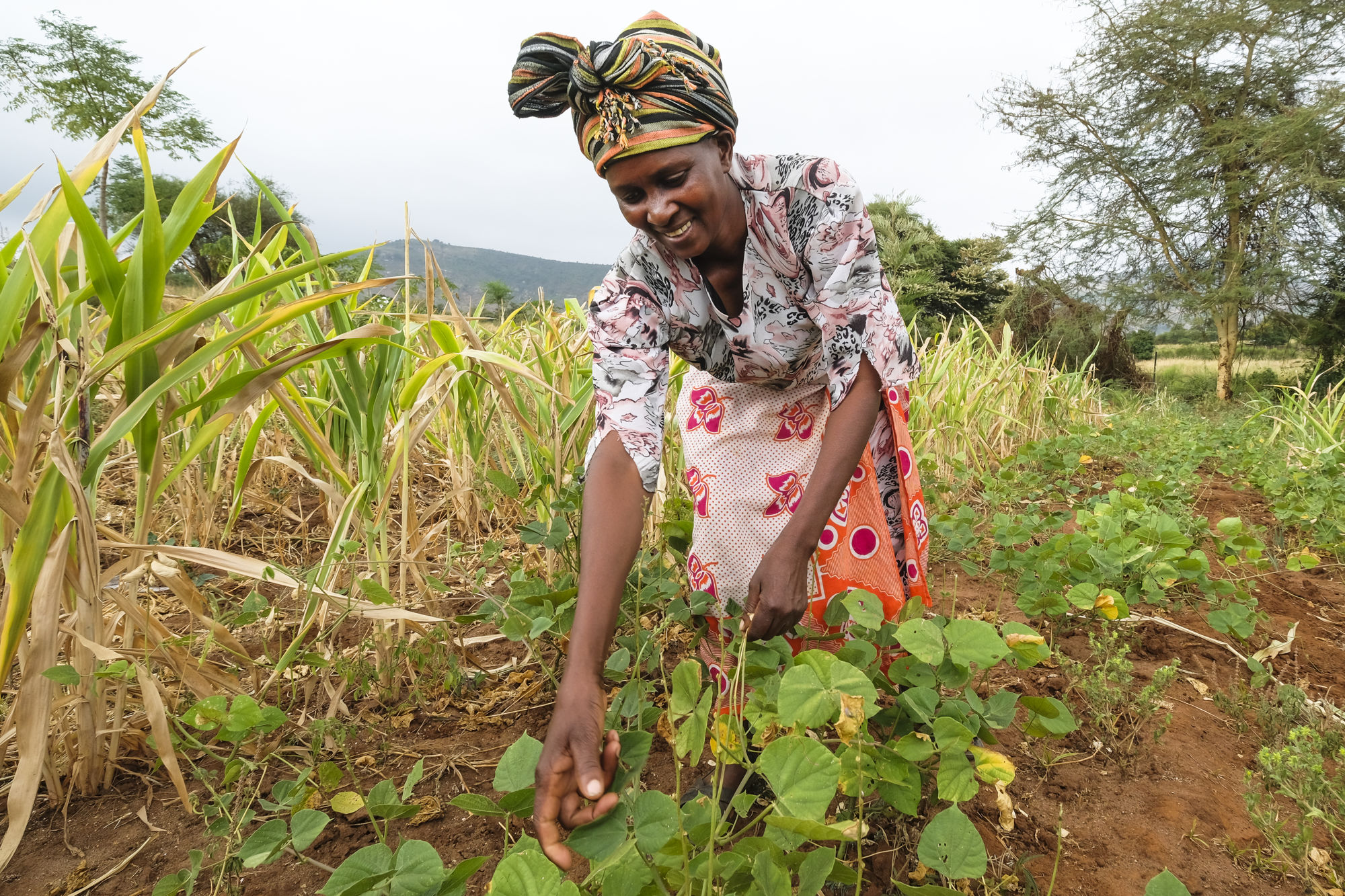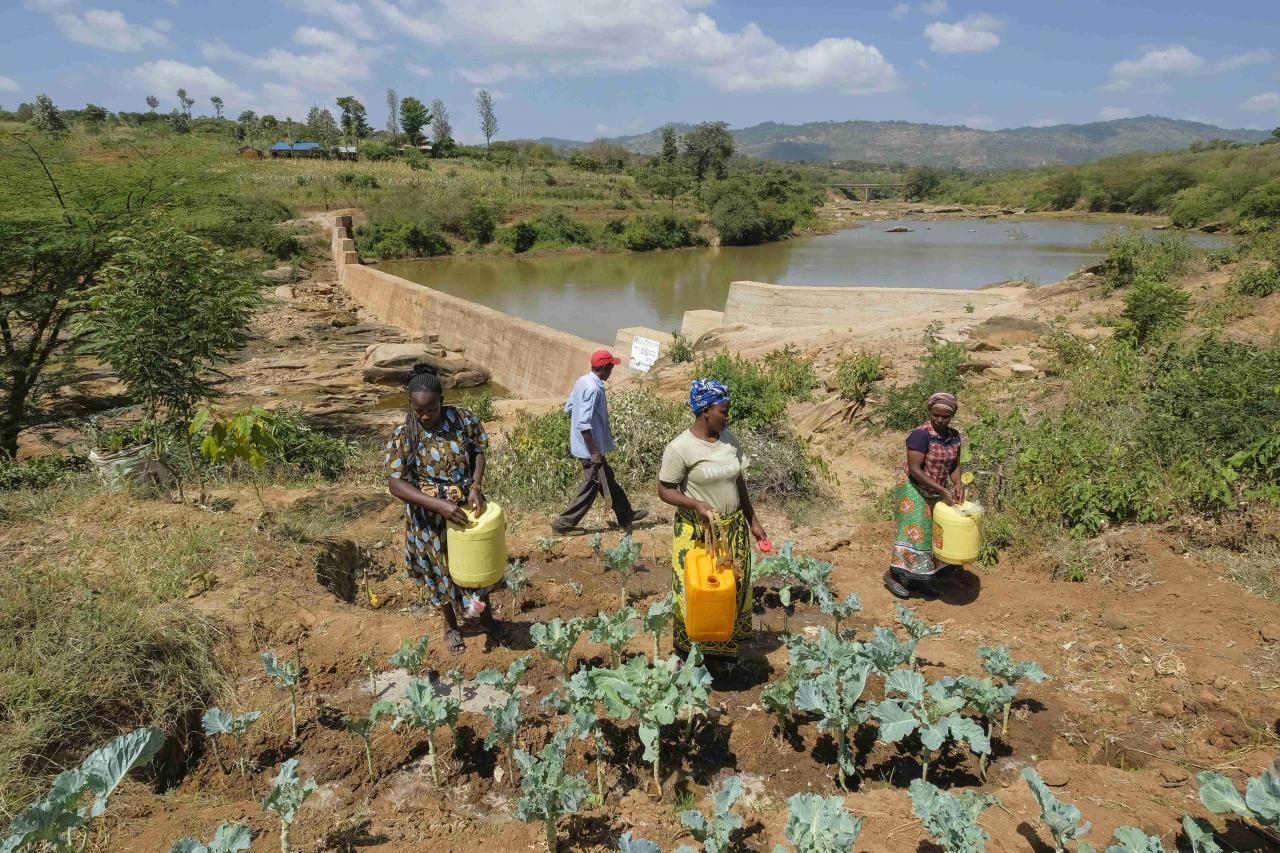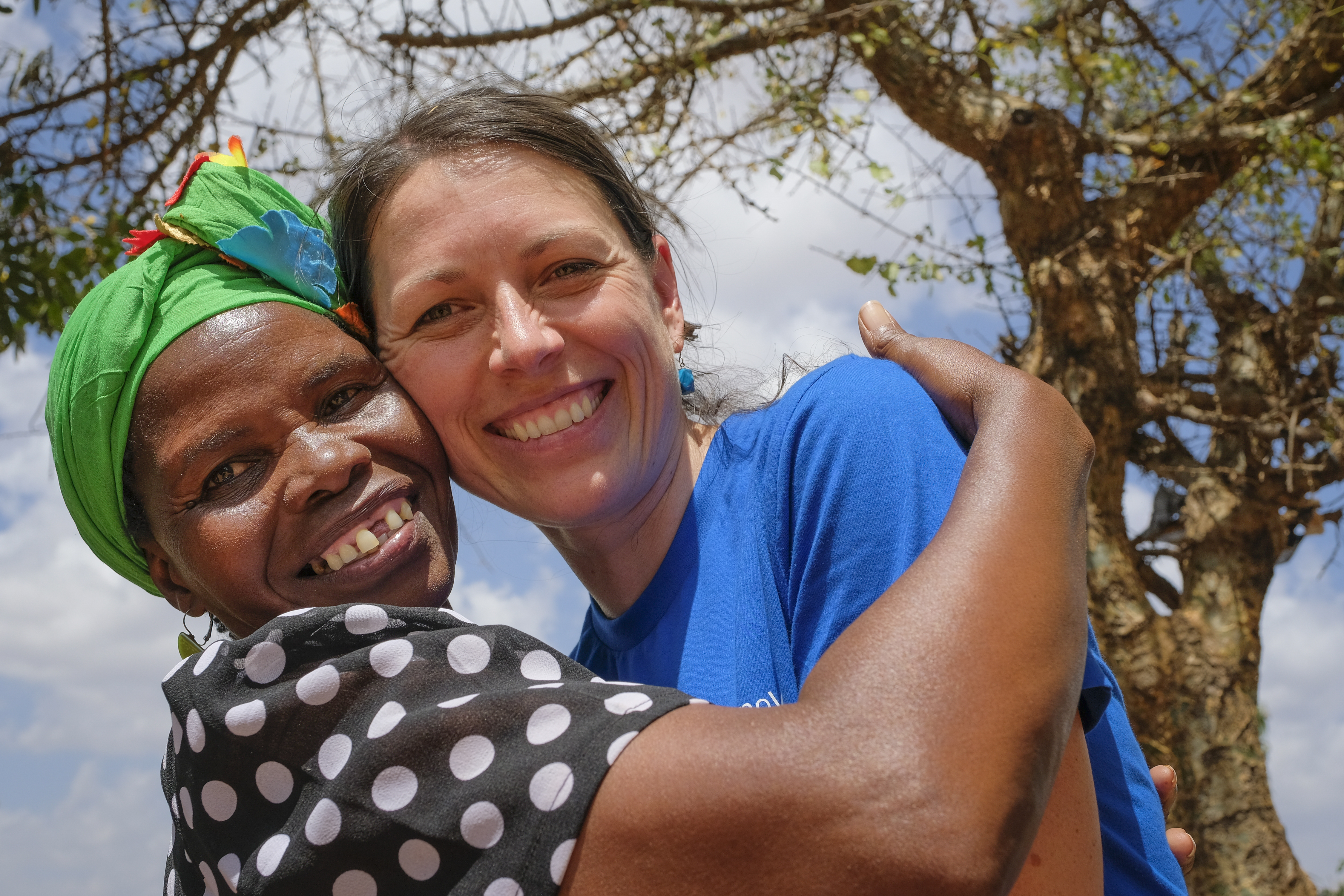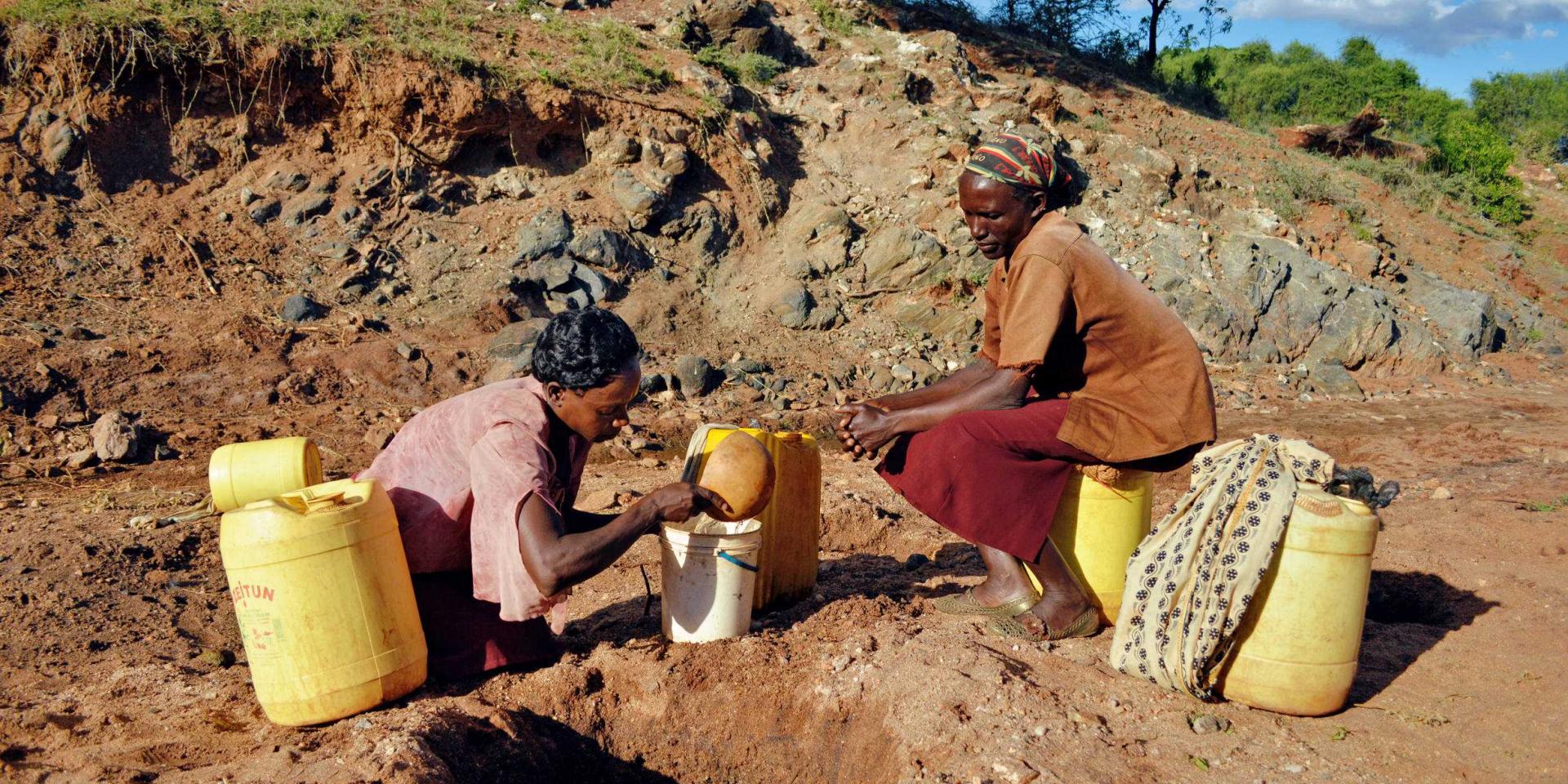
Ever since she can remember, Stella Maris Mwende has been lugging water containers on her slender shoulders. Five kilometres to the Athi River, five kilometres back. "When we arrived at our village, we were often so tired that all we could do was cook and eat," the 46-year-old recounts of her childhood in Kasengela. Like all people in the central Kenyan steppe, she has to struggle with droughts that are getting increasingly worse.
How sand dams changed the life of Stella Maris Mwende
"Water was only available in our village during the rainy season. After that, we always had to walk to the river - sometimes several times a day," Stella Maris Mwende recalls. This was also the case for her mother. The water, which she laboriously carried on her back, was heavily contaminated. "My parents died early because they were infected with germs from the river water," says Stella Maris Mwende. She can hardly believe that the suffering resulting from the poor supply has now come to an end.
Water as a Christmas wish
In Kenya, people celebrate the festival of love in summer temperatures
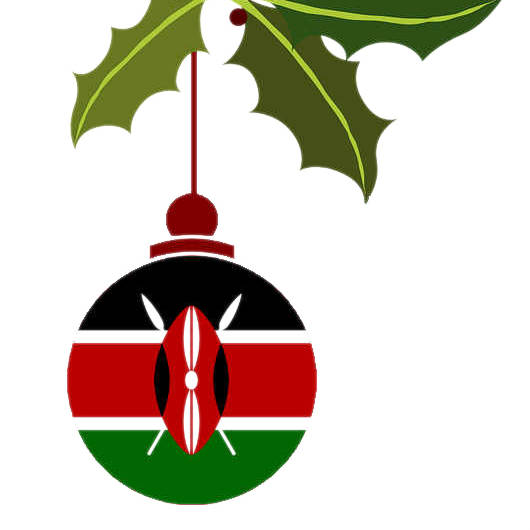 At least the initial letter is the same. W for Christmas and Wasikuku. In the language of the Kamba people in southeastern Kenya, it means something like "great feast" and is considered the mother of all holidays.
Although with an average of 28 degrees and eight hours of sunshine a day, the atmosphere is somewhat different than here in Germany, the meaning of Christmas is the same.
At least the initial letter is the same. W for Christmas and Wasikuku. In the language of the Kamba people in southeastern Kenya, it means something like "great feast" and is considered the mother of all holidays.
Although with an average of 28 degrees and eight hours of sunshine a day, the atmosphere is somewhat different than here in Germany, the meaning of Christmas is the same.
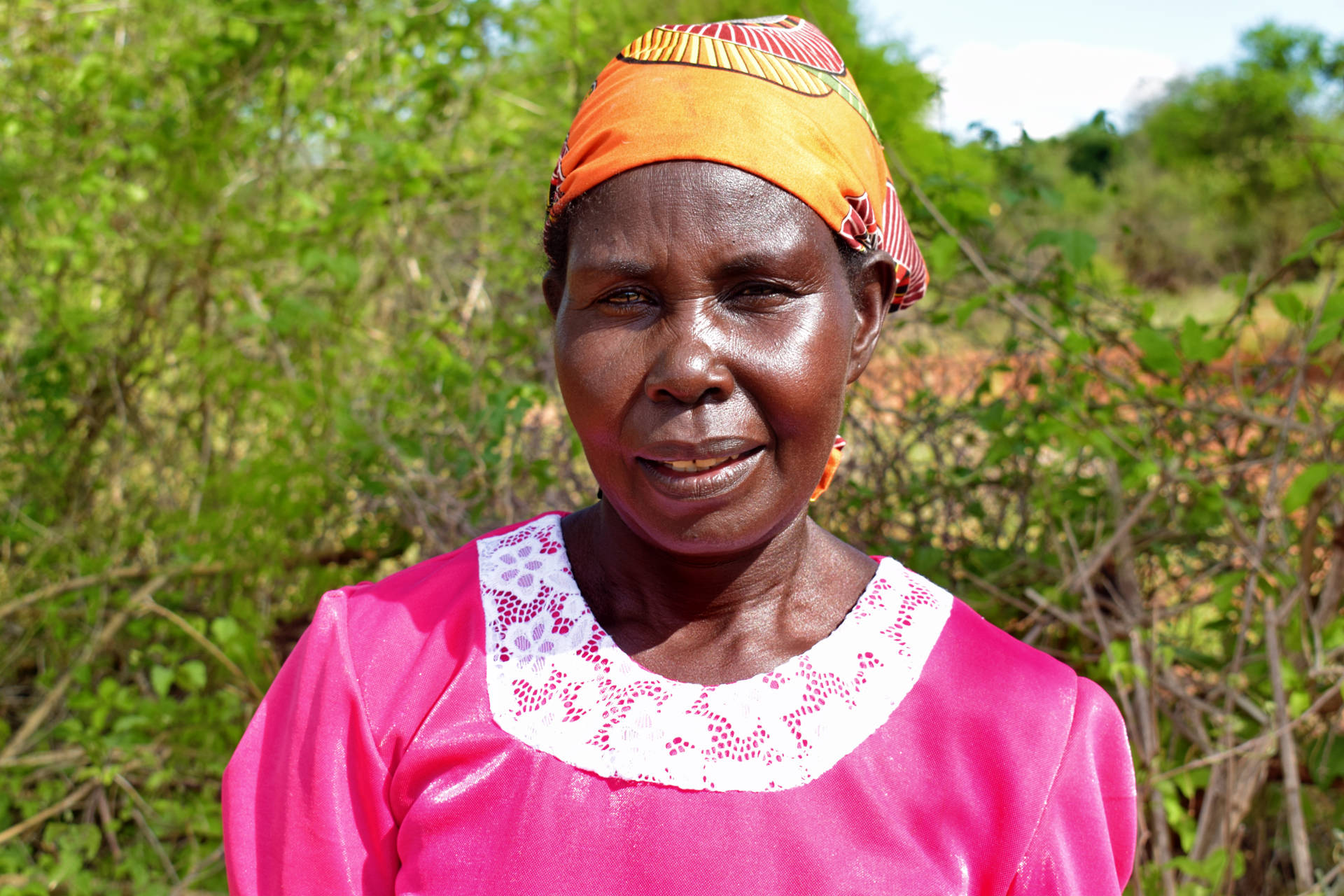 „Wasikuku ist das Fest der Liebe und der Freude. Es ist die einzige Zeit im Jahr, wo die ganze Familie mit Kindern und Enkeln zusammen kommt“, erzählt Mary Syunthi aus Mwingi. Für die 54-jährige Bäuerin war das Weihnachtsfest im vergangenen Jahr ein ganz besonderes. „Ich durfte mein jüngstes Enkelkind zum ersten Mal in den Armen halten – ein atemberaubender Moment. Ich kann es kaum erwarten sie alle in diesem Jahr wiederzusehen.“
„Wasikuku ist das Fest der Liebe und der Freude. Es ist die einzige Zeit im Jahr, wo die ganze Familie mit Kindern und Enkeln zusammen kommt“, erzählt Mary Syunthi aus Mwingi. Für die 54-jährige Bäuerin war das Weihnachtsfest im vergangenen Jahr ein ganz besonderes. „Ich durfte mein jüngstes Enkelkind zum ersten Mal in den Armen halten – ein atemberaubender Moment. Ich kann es kaum erwarten sie alle in diesem Jahr wiederzusehen.“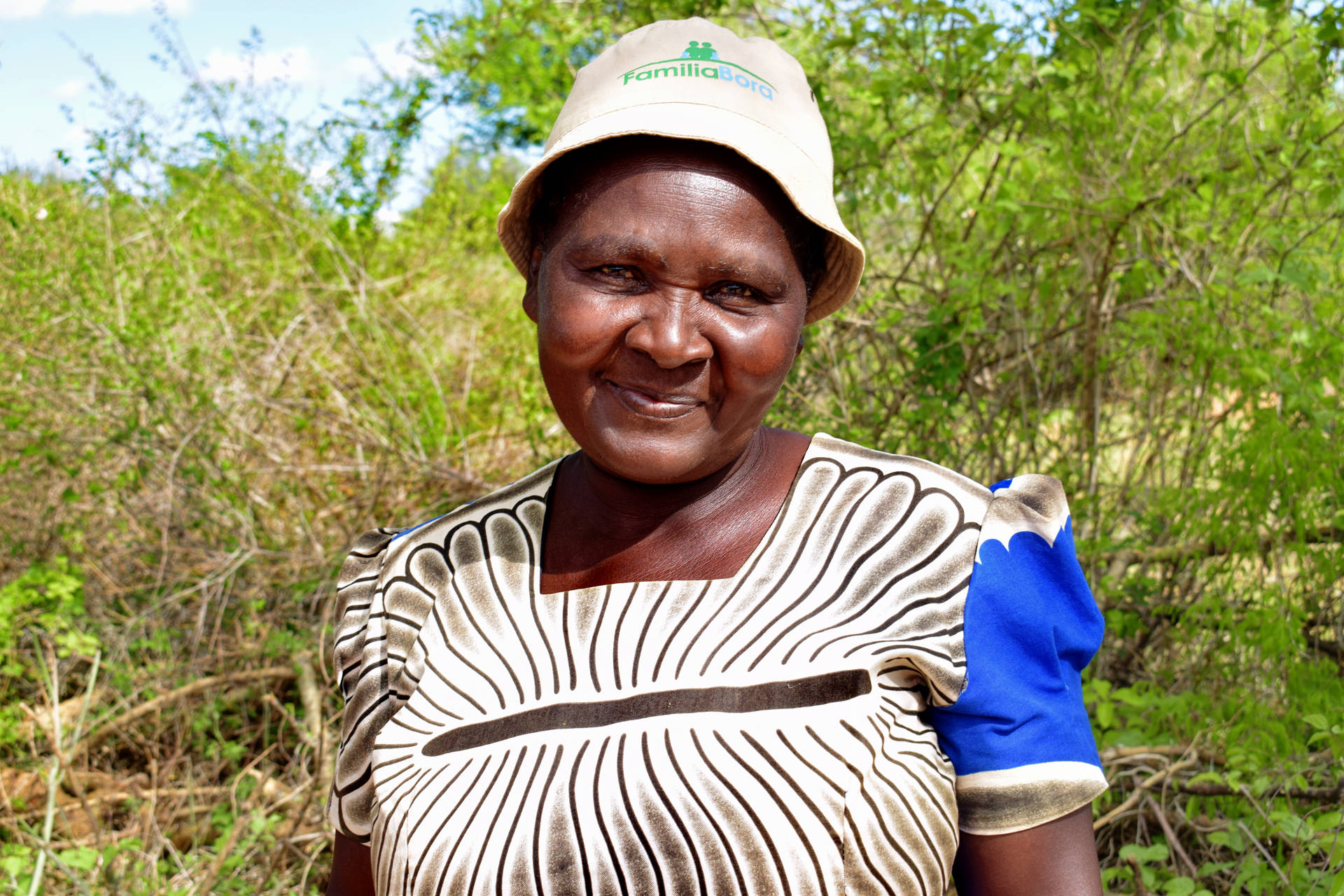 Auch Marys Nachbarin Kamene Mwendwa freut sich auf die Feiertage. Mit den Vorbereitungen beginnt die Farmerin jedoch erst kurz vor dem eigentlichen Fest. Dann geht sie auf den Markt und kauft Reis, Öl, Weizenmehl, Gemüse und andere Leckereien, wie Limonade, die es an normalen Tagen nicht gibt.
Auch Marys Nachbarin Kamene Mwendwa freut sich auf die Feiertage. Mit den Vorbereitungen beginnt die Farmerin jedoch erst kurz vor dem eigentlichen Fest. Dann geht sie auf den Markt und kauft Reis, Öl, Weizenmehl, Gemüse und andere Leckereien, wie Limonade, die es an normalen Tagen nicht gibt.- Das eigentliche Weihnachtsfest beginnt dann mit dem Gottesdienst in der Heiligen Nacht. „Mit Lobesliedern und Gebeten gedenken wir der Geburt Jesu und danken Gott für das wertvolle Geschenk. Am nächsten Morgen werden die Feierlichkeiten in der Kirche fortgesetzt, dann ziehen die Leute ihre neuen Kleider an, die sie extra für das Fest gekauft oder geschenkt bekommen haben und die Frauen flechten ihre Haare auf ganz besondere Art, extra für Wasikuku“, erzählt Kamene Mwendwa. Und natürlich gibt es Spielzeug für die Kinder und ein Festessen für die Familie. Es ist Tradition, dass die Frauen kochen, während die Männer das Fleisch grillen. Das klassische Festessen in Mwingi sind Mbuzi choma (gegrillte Ziegenrippchen) und Chapati (eine Art Fladenbrot). Trotz diverser Rituale gibt es in diesem Jahr auch eine Besonderheit – und zwar der Weg zum Wasser.
- „Unser Leben ist sehr viel leichter, seit wir einen Sanddamm in unserem Dorf haben. Wir müssen nicht mehr stundenlang laufen, um Wasser zu holen zum Kochen und Waschen“, sagt Kamene Mwendwa. „So können auch unsere Töchter und Enkelinnen mit uns feiern oder sich einfach mal ausruhen – besonders an Wasikuku. Dafür sind wir sehr dankbar.“ Was sich die Bäuerin zu Weihnachten wünscht? „Ich bete, dass wir alle gesund bleiben, und dass es in den nächsten Wochen genug regnet, damit sich ausreichend Wasser in unserem Brunnen am Sanddamm sammelt“, sagt Kamene Mwendwa.
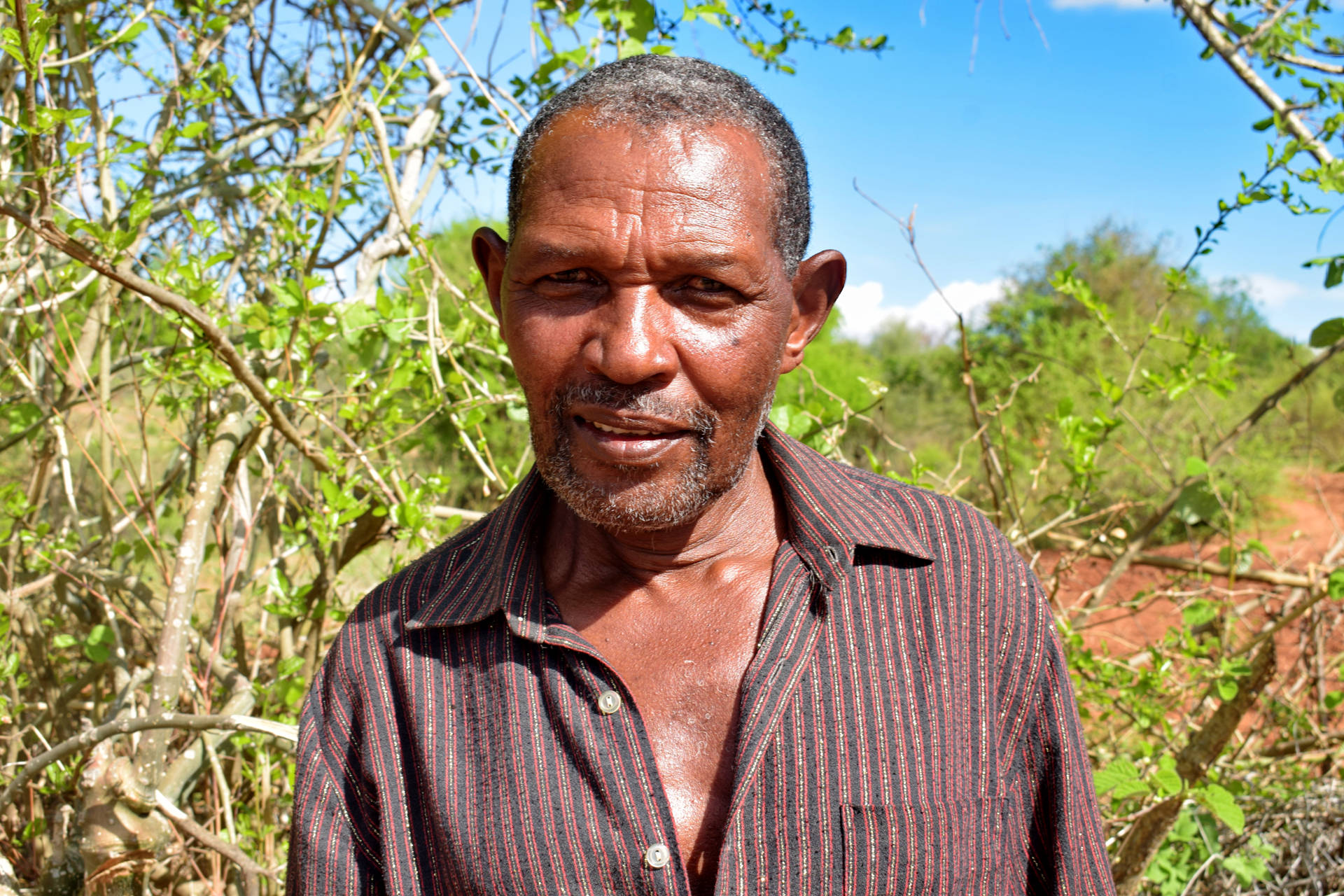 Das hofft auch Simon Mutui, der ebenso wie Kamene und Mary Mitglied in der örtlichen Selbsthilfegruppe Wendo wa Katuluni ist, die den Sanddamm in Mwingi mit Unterstützung von arche noVa und der Afrikanischen Sanddamm-Foundation (ASDF) gebaut hat. Für Simon Mutui, einen 62-jährigen Farmer und Familienvater ist es jetzt noch viel zu früh, an Wasikuku zu denken. Für ihn ist Ende Oktober erstmal Pflanzzeit. „Mir ist wichtig, die neue dürre-resistenten Samen in die Erde zu kriegen, die wir von unseren Partnerorganisationen bekommen haben, damit wir dann möglichst viel ernten können“, erklärt Simon Mutui. Wenn das Grün auf den neu angelegten Feldern sprießt, dann kann auch in Südost-Kenia Weihnachten kommen.
Das hofft auch Simon Mutui, der ebenso wie Kamene und Mary Mitglied in der örtlichen Selbsthilfegruppe Wendo wa Katuluni ist, die den Sanddamm in Mwingi mit Unterstützung von arche noVa und der Afrikanischen Sanddamm-Foundation (ASDF) gebaut hat. Für Simon Mutui, einen 62-jährigen Farmer und Familienvater ist es jetzt noch viel zu früh, an Wasikuku zu denken. Für ihn ist Ende Oktober erstmal Pflanzzeit. „Mir ist wichtig, die neue dürre-resistenten Samen in die Erde zu kriegen, die wir von unseren Partnerorganisationen bekommen haben, damit wir dann möglichst viel ernten können“, erklärt Simon Mutui. Wenn das Grün auf den neu angelegten Feldern sprießt, dann kann auch in Südost-Kenia Weihnachten kommen.
Helping people to help themselves
The hands-on farmer herself is part of this change. Together with other villagers, she founded the self-help group "Utonyi wa Kasengela". Their most important goal: to make water permanently available - not only in the few weeks of the year when it often flows through the landscape like a flash flood and sometimes destroys more than it benefits people.
With arche noVa and the Kenyan partner organisation Africa Sand Dam Foundation, a sand dam is being built in Kasengela to catch rainwater in the mostly dry riverbed. The whole village was on its feet for months to bring in stones and sand and to help build the concrete wall. That was in March. Since then, the people around Stella Maris Mwende have also learned how much water and health are connected and how to use water in the long term.
Water for people and nature
In workshops, they learned about reforestation and sustainable agriculture. As long as she has lived, Stella Maris Mwende cannot remember vegetables ever growing in her region. For that, you either had to go to the market in Kalawa or Ikalaasa and pay dearly for it. "Or we would hear the vegetable truck drive by and quickly run after it to get some," she recalls.
Now there is spinach, kale, cowpeas and much more. Stella Maris Mwende is happy: "Last year was definitely the best for me and my village. We have learned a lot and can earn much more from our work as women farmers than before. And the best thing is that we have clean water practically on our doorstep."

